#chinese nobility
Explore tagged Tumblr posts
Text










Warring States Beverage Fridge of Marquis Yi of Zeng
Judging by the burial items, Marquis Yi, this Chinese Petronius, was a socially inclusive person and managed to keep a positive outlook on life even under the Warring States.
This antique beverage fridge was found in 1978 among the treasures of the Leigudun Tomb No.1, Suizhou, Hubei.
A smaller vessel (Fou 缶) with rice wine was placed inside Jian (鑑) bronze frig, fixing all with three hooks on the bottom, and ice cubes were poured between the walls. Cooled rice wine was filtered and scooped up with ladles when needed without removing the inner container.


Two such beverage fridges were discovered in the burial site. Like some other items, Jian frig is signed “For the perpetual use by Marquis Yi of Zeng.” In his quirk, the Marquis is not unique: beverage fridges have been common since at least the Spring and Autumn period. However, for few they were such an essential utensil to take it with to the afterlife.
Total weight (Jian + Fou) is 168.8 kg. On display in Hubei Provincial Museum (湖北省博物館).
Photo: ©湖北省博物馆藏
#ancient china#chinese culture#chinese art#chinese history#warring states era#warring states period#ancient tomb#unique#Marquis Yi of Zeng#chinese nobility#bronze design#bronze vessel#bronze art#bronze#limited edition#zhou dynasty#refrigerator#fridge#beverage fridge
46 notes
·
View notes
Note
This question might seem a bit dumb. But my mind likes practical qquestions and i can't imagine it, but how did chinese women use the toilets while wearing different styles hanfu? It just seems a bit nervous, to accidentally dirty such a pretty outfit while doing the do. Also mensturation now that i think about it, how did the ancient chinese woman deal with her period?
Hi, thanks for the question, and sorry for taking ages to reply! (x)
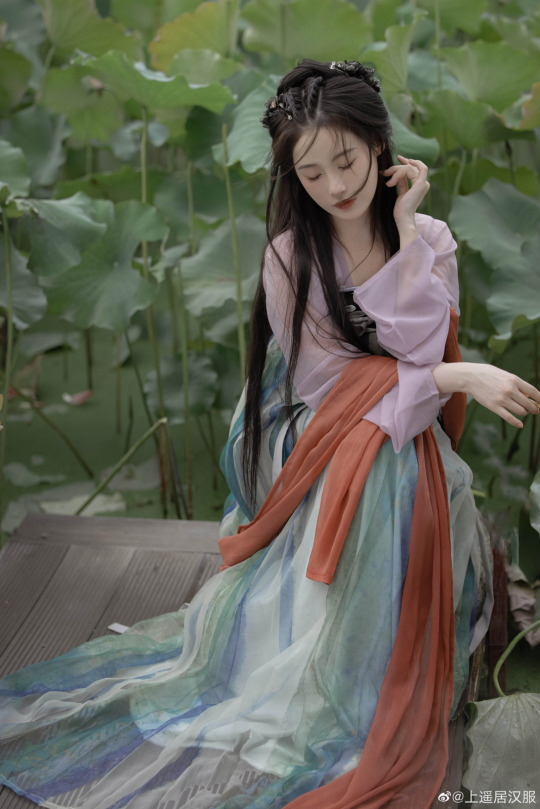
Something to keep in mind is that the ultra flowy, ethereal designs popular in modern hanfu aren't what average Chinese women would have worn on a day-to-day basis historically. As can be seen in my commoners' hanfu tag, the common woman's daily hanfu was simpler and more practical with less use of fabric - which meant narrower, shorter sleeves and shorter hems. Long, elaborate hanfu was reserved for formal/special occasions and the wealthy/elite.
Thus, using the toilet wouldn't have been as difficult as you imagine - women could simply gather and bunch up their sleeves and skirts/robes (and/or if they were wearing pants, untie and lower their pants), and do business as usual.
As for people who regularly wore "fancy" hanfu such as the nobility, they would change clothes (called "更衣/geng yi") when using the toilet, either:
Removing their clothes, using the toilet, and then putting their clothes back on, or
Changing into a new set of clothes after using the toilet
There would typically be maids to help facilitate these steps. For example, it's said that wealthy politician Shi Chong of the Western Jin dynasty kept maids at the entrance of his house's bathroom. After guests used the toilet, the maids would assist them with changing into new clothes before they could come out.
As for menstruation, I have a post here on how Chinese women dealt with their periods historically.
If anyone else has more information, please share!
Hope this helps!
Sources: 1, 2
#hanfu#bathroom#toilet#commoners hanfu#royalty and nobility#maid#servant#menstruation#history#reference#chinese clothing#chinese history#chinese culture#china#>100
142 notes
·
View notes
Text
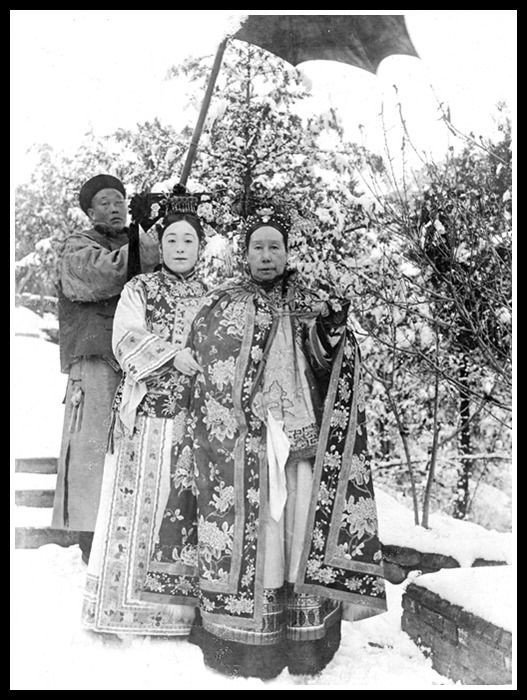
Empress Dowager Cixi with her lady-in-waiting, Yü Der Ling (also known as Princess Der Ling) and a enuch during a snowy day
#empress dowager cixi#Der Ling White#chinese imperial family#qing dynasty#chinese history#nobility#house of aisin-gioro
24 notes
·
View notes
Text
clutching my head doubled over that the things im into are always games that are dozens of hours long to long jrpg length because im going mental thinking abt my funny guys. and the last time i tried to let out my kh meta thoughts i got sucked into a like. fucking real world particle dimension spirituality talk so i just have to sit here
#i JUST FINALLY internalized today the difference between emblem and pureblood heartless#im feeling NORMAL about the unique attacks of characters#and im dangerously close to fusing my aus finally and it feels like a cataclysm#not even getting into raincode#ive been feeling normal about the chinese character radical research i did today too#xion namine and kairi... wa#also been kind of obsessed with uhh#aqua's heavy association with rain ice and weather compared to the clear ocean theming of the girls#something about the more european/japanese nobility and soldier insp for the keyblade bitches?#idk thats an area i need wayyyyy more research on on all vectors#but like the obvious thing is Destiny Islands and the moon. as always
1 note
·
View note
Text
#sexypink/Carlisle Chang#sexypink/The Inherent Nobility of Man#sexypink/Independence Day#sexypink/Art Icons of Trinidad and Tobago#sexypink/Chinese Trinidadian Artists#tumblr/Carlisle Chang#tumblr/Painters#tumblr/national treasures
0 notes
Text
Huh. I figured out a way to solve a language issue that I had in The Book I'm Not Writing, that clears out some tangles that I hadn't really even thought of solving. Language barriers and different writing systems.
The first draft of the book featured two languages: The language spoken by the imperialist 'elite classes', and the common tongue spoken by the common people. It was a plot point that the protagonist - who was shipped to the Empire when he was 10 years old - learns to speak both of them fluently, but speaks Imperial like a finely educated nobleman and common like the lowest ranks of street thugs, and distinctly in the dialect of the slums of one specific city. But having a story with two clearly defined languages with no overlap between them started a lot of problems that distratcted from the plot, so I decided to discard that, and decided to just go with them being different dialects.
And just now it occurred to me that almost all the "lost in translation" sort of plot points that I did need the bilingual setting for were about writing, and that I could just resolve this by having two different writing systems for the (different dialects of) the same language. Like perhaps Imperial script is much like written chinese, featuring elegant, sophisticated, elaborate characters that can depict a number of different things, and the Common script is more like finnish, written phonetically with consistent sound for each letter - inelegant but practical, so one always knows how to spell a word they've only heard in speech, or how to pronounce a word they've only seen in writing.
The protagonist - being a baron - can read and write Imperial fluently, but having learnt the common dialect only from the stray boys he would sneak out to play with as a kid, cannot read Common script at all. So while he can fluently code-switch between speaking, standing and conducting himself like a baron, and moving and talking exactly like a Brethage slum stray, there is literally no way that he could fake being perfectly fluent in Imperial.
So to people who are on the upper end of the "lower caste" he does seem to be exactly as he seems - a stray lunatic who talks mad shit, occasionally claims to be a baron, but demonstrably could not read or write to save his life. But for someone who is familiar with the ways and etiquette of the nobility, seeing the Famously Batshit Foxtrap-Todd just casually code-switch and suddenly know exactly how to wear a rains banquet coat, properly pour tea, and be able to fluently read and recite poetry written in classic formal Imperial, would be as wtf-worthy as hearing a horse suddenly spontaneously start to speak.
1K notes
·
View notes
Text
Ride a Tiger | San [NSFW]
Choi San - ATEEZ

Rating: M (18+) MDNI
Word Count: ~6.2k
Pairing: Tiger-Hybrid!San x Deer-Hybrid!AFAB!Reader
Genre: Hybrid AU!, Historical/Joseon Era, Reader-Insert, Fluff, Smut, Some Plot, Strangers-to-Married
!!This is smut…if that much isn't clear you should probably leave now!! MDNI!
Warnings: She/Her Pronouns used, Swearing, Kissing, Biting/Marking, Bonding/Mating, Heat/Rut, Pheromones, Breeding Kink, Bath/Water Sex, Unprotected Sex (This is pre-birth control so…), Monster(?)!San (not really, he's a tiger hybrid)
Author's Note: Just so you know, this is NOT Omegaverse, but they do both go into rut/heat. They have animals ears and tails and he's got a spiny tiger cock. This is vaguely set in the Joseon Era of Korea, which is a pretty long time range. It is after the creation of hangul, so its post 1600s about. I only know a lot of this stuff from, and am copying from, historical/period dramas. I know in a lot of ways they aren't completely accurate, especially with women going around and not covering their heads/faces. This is not supposed to be accurate, by any means. Let me know if something is horribly wrong.
At the bottom I will have a guide for all the untranslated words I use, most of which are to do with the clothing they wear.
"He who rides a tiger is afraid to dismount." ~Chinese Proverb
-> Series Hub <-
🦁 Hongjoong's 🦁
🐕 Yeosang's 🐕
🐻 Jongho's 🐻
Revised (1/31/25)
I am cross-posting this on Archive. Please reblog! Share, even if its to the other sites! Let me know if you want to be on the taglist!

When you heard thunder rumbling in the distance earlier, you didn’t think anything of it. You’d be done before the rain comes! Nope. You scramble to gather all of the books you laid out at your stand, getting them under the surface so they won’t get damaged. A giant flash of light followed closely by clap of thunder startles you, and you bleat, your long furry ears pressing back against your hair. Your short tail under your hanbok twitches, slightly rustling the fabric it lays under. Once all of the books you’re selling are safe, you grab the sseugaechima you have and sling it over your head, stepping back toward the building you’re in front of. It’s some kind of accessories shop, but the roof awning is quite short and so you’re barely able to hide from the downfall underneath it. People scramble on the street to flee to rain, and the few of them that have coverings continue on their way normally. You peek out from under your own covering, observing the sky best you can. It’s clearly not going to end anytime soon; it’s just that time of the year. You have no idea how you’re going to get all the books back to your house. Your father doesn’t mind you working to copy and sell books for the local seller, but he won’t let you establish your own business. The seller you work for also doesn’t have a store front himself and so the two of you sell at stalls in the market.
You decide to wait just a bit longer, wondering if the shop owner of the building behind you will let you store the books for a bit. The street has more or less cleared out, but you watch a nobleman come closer. His clothes are nice, even nicer than yours, so his status is probably much higher. The gat he wears is adorned with a silk strap and the beading is clearly finely made as well. As you look over him, the belt tying his jeogori accentuates his narrow waist and wide shoulders. Your eyes travel up to his face and he’s stunning. But also…he has tiger ears. As he gets closer, you catch a glimpse of his long tail. Definitely a tiger. It’s incredibly likely that the guy is not just nobility, he’s possibly one of the princes. There are like eight of them so that isn’t too unlikely. Despite the downfall, he’s simply strolling down the street, almost likes there isn’t any rain. Since you’re one of the few people still outside, he stops in front of your seemingly empty stall. He lifts his head, and his eyes meet yours and you feel them widen. Instinct flares to life, your deer-like genes screaming at the sight of the predatory gaze. It isn’t that he’s trying to scare or threaten you, he just simply is a predator hybrid, and you a prey.
"Have you nowhere to go to escape the rain?" He’s definitely of high status, with not just tone but the exact words he uses. You nod dumbly, back pressing to the stone foundation of the building behind you. The sseugaechima over your head covers your deer-like ears and your tail is completely hidden by your hanbok.
"I-I have books to sell, and I don’t want them to get wet." You point under the stall, and at the crate that holds your wares. He makes an 'ah' of acknowledgement. You wonder why he feels the need to stop at an empty stall.
"You might have to wait a while for the rain to stop." He looks up at the sky. You sigh, knowing he’s right.
"Do you want me to help?" He offers and you flinch. Really?
"If you wish, my lord." You bow a bit, and he huffs.
"Shh. Pretend I'm not that important." His smile is much softer than you expected from a tiger. You nod, not able to speak and he comes around and you drag the crate out, ready to use the sseugaechima to cover it.
"Use this." He corrects, taking the cloth that you’d laid out on the wooden stall, and you wonder how frazzled you are that you forgot about it. He tucks the edges of the fabric over the books and easily lifts the crate. You move around him so you can start to lead him home and you feel tense the whole time. Negating that he’s a tiger and you a deer, he’s clearly a nobleman, and he’s doing physical work…Then again, you’re technically a noble yourself, and a female at that. Finally getting to the entrance for your family's estate, the gate is open already and you wave for one of your father's guards to come and help. The guard takes the crate from the tiger, bowing deep in respect and then dashes off to put your wares in your quarters.
"Thank you, my lord." You bow again, sseugaechima still covering your head.
"San." he adds, and your brow furrows trying to wonder why he’s talking about a mountain. Then it hits you, it’s his name, he is one of the princes!
"Oh, yes, your highness. (Y/N)." You introduce yourself as well, staying bowed and making sure not to look at his face.
"Get inside and out of the rain Lady (Y/N)." He smiles and your eyes flit to his gorgeous face. You bow deeper then dash further into the courtyard and book it to your quarters.
~θωθ~
Looking up at the clear blue sky, you squint at the tiny white cloud you can see. It had rained for nearly four days straight and therefore you couldn’t set up your stall for that long. You don’t really have need for money since your father is…well, rich, but he doesn’t just give you pocket money to buy stuff for yourself. It’s because you want books that aren’t normally what noble women would read, you know, like things you can actually learn from. You’ve read more than your fair share of romances and adventures from copying them. After you’ve set out the final pile of books, you look at your hand and rub your finger over the callus you got from holding the brush. Yes, it’s painstaking, but you’re extremely glad that you can use hangul, it would take ten times longer if you had to use hanja. Right as you get done setting up, two women stroll up and you continue your day.
~
About an hour before you’d get ready to go home, you note that you’ve done well for the day and have only about six books left, each a different one. Since it had slowed, you’re sitting on a stool, people watching the few that are wandering around. It’s nearing the evening mealtime, and you can smell the food from the restaurant down the road on the corner. Your stomach rumbles and you sigh deeply, ears drooping. You start to zone out a bit, watching some birds on the ground, not looking up when someone stops.
"What is this one like?" the man asks, and you finally look up so you can see which book he’s pointing to.
"Hm, something about a servant seducing a nobleman's son…" You sniff and look up at the guy and startle. It’s that prince from before! Even if you hadn't carved his face into your memory, it’s a bit obvious from his tiger ears right under the brim of his gat. You immediately stand and bow, and he looks around quickly.
"It's fine, I'm trying to lay low." He waves you off and your eyes catch sight of the black claw-like nails on the end of each finger. You risk glancing up at his face and he’s smiling, dimples indenting his cheeks, your eyes focus on his large canine teeth. You feel your tail flick a few times, your skirt ruffling a bit. You feel his eyes moving over your face and your ear flicks at well, nervous under the gaze of his golden colored eyes. You freeze when his arm moves, hand coming up and your eyes follow the movement till you can’t see, and you feel a little tug on your earring.
"These aren't real." He makes note of it, and you cringe. You had wanted real jade earrings, but you didn’t have enough money, and so you had to settle with those instead. Your father might have bought those for you, but you really wanted them right then and there. You aren’t even sure what they’re actually made of.
"N-no." You bow your head, and he lets them go.
"When do you leave?" His question startle you and your ear flicks again.
"In about an hour."
"Don't leave till I get back." He tells you and he heads off further down the market road, back the way he came. You blink after him, eyes wide, wondering what the heck that was all about.
~
You do as he asked though and wait for him to return. Glancing up at the sky, you have another ten minutes or so and he still isn’t back. If you didn’t know he was one of the princes, you’d have left, but he told you to stay. You still hadn't sold the rest of your books despite a few people stopping by, and so you start to put them in the crate. Looking down into the mostly empty container, you look to the side and see him coming. Even at a distance you can see his smile when he notices you’re still there, and he jogs to meets you sooner.
"You stayed."
"Well, you said to." You shrug, not looking at his face. Part of it’s because of his status, but it’s also because he’s so handsome. Too handsome, actually. You wonder if all the princes are so. You watch as he pulls something out from the interior pocket of his jeogori, a small but detailed wooden box coming out. He holds it out to you, and you hesitated to grab it.
"Go ahead." He waves his arm a bit and you gently take it with both hands, lifting the hinged lid. You gasp, looking at the earrings inside. They look nearly identical to yours, but they’re obviously real jade.
"W-what?" You have to look at his face then, see what his expression is for some sort of explanation. His cheeks are a tiny bit red, and his own ear flicks some and you can see his long striped-tail swaying behind him.
"Your Lord Bak's daughter, from the Saseum Clan?"
"Y-yes?" He smiles a bit bashfully, looking down as he swings his leg around, drawing a circle with his foot.
"Can you take me to talk to him?" You nod jerkily, a little shocked at the request. Before you can grab the crate, he takes it, and you ball up the cloth from the stall and shove it on top of the books. You walk next to him as you head toward your home, feeling a bit weird, like you should be following him. You’ve never directly interacted with a prince before him, but you still know the basic rules. Don't look at his face, walk behind him, don't be physically higher than him, speak formally… Yes, he’s trying to lay low, but that doesn’t change who he is. You wonder who is genuinely ignorant enough to not know who he is though since he’s so obviously a tiger hybrid. When you show up to the house with the same man carrying your book crate as the time before, your father's guard is a little skeptical. He still takes the crate from the prince- San, his name is San, you remember.
"Can you please get Lord Bak?" He asks and the guard's gaze flicks to you, and you give a short nod. As he goes to do so, you stand with the prince awkwardly, swaying just a bit so your skirt twirls a bit around you. Your ears are twitching so much that your old, fake earring jingles. Your arm twist around your back so your hand can tug on the end of your braid, a nervous habit.
"(Y/N)? Who is this?" Your father comes around the corner, strolling down the stone-paved path toward both of you. He glances at San, and you cringe slightly at how much smaller your father is than him. His jeongjagwan is modified to fit around his antlers, only that puts him at the same height as the prince.
"I am Prince San, Lord Bak. I have come to ask permission to court your daughter for marriage." You balk at this, turning to gape at him directly. Your head turns back to your father whose gaze has sharpened. You know that there’s a lot of noblemen that have brought their sons as potential suitors, and your parents have turned down every single one. Will San be different? You’re lucky that your parents do takes into consideration your opinion on most things.
"You are the fifth eldest, no?"
"Yes."
"Are your parents aware of your request?"
"Not yet, though I have been given more freedom since I am far down in the line of succession." It seems the men are having another conversation through their eyes.
"Is that why you’d be allowed to marry a prey hybrid?" The prince falters for a reply, it seems he hadn’t even taken that part into consideration.
"I will need to request an audience with his highness." Your father answers and San seems to deflate.
"What do you think of this?" Your father turns to look at you and you cast a nervous glance at the tiger next to you. You know that you’ll have very little say in reality, and you wish you lived about a thousand years earlier. You know, before Confucianism ruined feminism. Though, the prince seems to be very sweet, and he’s extremely attractive. It could be way worse.
"If my lord finds it auspicious." You bow your head a bit and your father hums.
"Why don't you go back inside, (Y/N)?" The request is more of a command than a suggestion and you scurry off to do so. As you enter, your mother comes down the hall and you meet her.
"Geez, mother…" You lead her to spin around, and she does, though with a confused look. Adjusting her binyeo so it’s setting in her bun evenly, she then turns back to face you.
"Were you speaking with someone?" She peeks around you so she can look out the window, but she can’t see.
"A suitor…" You tell her and her long, furry ears perk up.
"I shall see then," she nudges past you and goes to go out and you huff a sigh, heading back to your room.
~
"(Y/N), your father requests your presence in the courtyard." A handmaiden comes to summon you, and you get up from your floor desk to follow her out. Your father is not alone, Prince San standing with him. It was only three days prior that your father had an audience with the king, and since the prince is there…
"Yes, father?" You come out and stop before them, bowing at the waist some.
"It seems that it is auspicious…" Your father tosses a glance at the prince, and you look up at both of them. Your gaze going to the tiger's handsome face, and he’s beaming.
~^ω^~
The next few weeks are a blur and before you know it you’ve gone through the marriage ceremony, and you’re moved into his own little palace that belongs to the greater palace grounds. Since he’s one of the younger princes you share a palace, whereas the queen and the crown princess have their own places. There’s a place as well for any consorts that the royals might have as well, but it seems San requested you to live with him. Honestly, you think it quite impersonal for a husband and wife not to share a room and bed each night, but that seems to be the norm for royalty. When you learn that even princes sometimes have consorts, you got a little insecure. What if you alone aren’t enough?
"What's wrong, (Y/N)?" San's voice catches your attention, and you turn to him as he enters. You’ve been standing in the middle of the room, just looking over everything, the room fairly barren compared to the overall size.
“I was just…” You stop, trying to think of how to word it. He hums for you to continues.
“I was just trying to soak in everything I’ve been told to learn.” You lie, not ready to bring the subject up quite yet. Your head is pounding from all the new information you’ve been pumped full with and you’re nervous about messing up. Luckily since you were a noble already, you knew most of the rules and practices, but you’re going to be under a bit harsher scrutiny. Not a bit, a lot. Your head feels strange, having your long braid looped up into a chignon braid, the jade binyeo holding it up making it feel heavier. The cheopji sitting on the middle of the top of your head is heavy as well, since it’s gold. Your hanbok is of much higher quality and you feel nervous about getting it messy or torn somehow.
"(Y/N)?" He calls your name again and you snap out of your tumbling thoughts.
"Why did your eldest brother step down as heir?" You finally remember the question you’ve been wanting to ask him, before your insecurities start to spiral. You’d heard some of the other women talking about it but don’t want to rely on gossip.
"Hm. The woman he fell in love with was too low in status. He abdicated so he could marry her. That's why Hongjoong is the crown prince."
"I see. The eldest is Seonghwa, yes?" San hums and you sigh, racking your brain for all the names you’ve learned. There are too many. Finally, you look over San…your husband. Just the thought makes you a bit giddy. Even though it hasn't been very long since you two met, maybe about two months, you have endeared to each other. He’s so sweet, contrasted greatly with the normal thoughts of how tigers are. Then again, he’s a hybrid, not a full tiger. He’s in a much different ensemble than what you met him in, more princely clothes. He doesn’t have any kind of headwear on then, just his manggeon and you can see the streak of orange and white in his hair to the right of the center of his head.
"Are you nervous?" he asks and your ears flick. Not really sure what he’s talking about, you just nod. You are, but you aren’t for sure in what way he means. He steps forward and his hands find your waist, your own landing on his chest. San pulls you closer and your ears press back against your head. Your nervous habit of tugging on your braid is going to have to be replaced since it’s no longer hanging down your back. You let out a noise similar to a bleat when he hauls you even closer, his nose nuzzling against your ear.
"We get to make it official." he whispers and what he’s getting at finally hits you. The consummation of the marriage. You’re nervous, and a bit worried as well. You were told that predators have a much more aggressive…mating process. Plus, apparently, tiger hybrids are much likes real tigers, and have 'barbs' on their… You’re in your own thoughts; you can say whatever; they have barbs on their cocks. Plus, you’re a good 30 centimeters shorter than your husband and he’s just big overall. Your hands on his chest fist, digging your fingers into the fabric and you squeak when the claws on his hands dig into your own clothes enough you feel them against your hips. You shudder as his slightly rough tongue runs up the side of your throat. Your heart rate spikes, nearly taking your breath away, some primal part inside of you freaking out.
"Your high-"
"It's just us, call me San."
"San, I-"
"Your highness!" A eunuch calls from the other side of the door, and you pull back. He reluctantly lets you remove yourself from him and you turn away from the door as he turns toward it. He allows the servant in, and you’re informed that the bathing chambers are ready. After the eunuch steps out and the handmaidens are waiting outside patiently, San goes back to you.
"Why don't we be efficient and take a bath together?" He wraps his arms around you from behind and you’re sure he feels your tail wag nervously even through the layers of fabric you both have on.
"C-can we?"
"Hm. I don't see why not. Not exactly traditional, but…I can get away with a lot." He chuckles and you feel it rumble through his chest pressed to your back. When he finally pulls back, you turn to him, face warm and he grins.
"So cute." He nuzzles your ear again and then comes back, leaning in and pressing his lips to yours. It’s your first kiss as a married couple, not that you haven't stolen a few leading up to that point. This one is different though and he nearly growls as he deepens the kiss. You squeak, it’s like he’s trying to eat you, and the obvious comparison is not lost on you. His tongue is rough against yours when it wiggles into your mouth and your head swims when his large canines clacked against your much smaller ones. When his lips let yours go, a trail of saliva connects your mouths, and you let out a shaky breath.
"Go with the handmaidens and get ready, I'll join after." San presses another kiss to your cheek and allows you to leave his embrace. You stop in front of the door, looking back at him again as the servant on the other side opens the door. He smiles warmly and you bite your lip giddily and then follow the maids to the bathing chamber. They carefully remove your garments and take your hair down, so it’s still just in a braid, you don’t need to wash it yet. You’re left in a simple white sokchima, not ready to be fully disrobed since San is still to come in. You hear his own servants getting him ready in the adjoining room and as soon as your maids leave, the side door opens. He steps in, closing it behind him and you gasp, eyes widening. Speaking of wide…his shoulders are so broad, especially compared to his waist. It’s fairly obvious even when he’s clothed, but right then he only has a pair of white sokbaji. His torso is toned as well and your mouth, still hanging open, starts to water. Well, not really, but you’re close. Feeling very small and delicate under his intense gaze, it softens when he notices your shoulders are tense.
"Come here." San coos, coming to meet you halfway and you let him hug you again, not able to help yourself placing your hands on his bare chest. His skin is smooth, and his muscles are hard and your thighs clench as you practically stroke him. He chuckles and your eyes flit up to his, ears flopping they’re twitching so hard. His tail is sticking out the back of his pants, swaying slightly, his ears drooping just a bit.
"Can I take this off, (Y/N)?" The prince's voice is quiet but deep in your ear and his hands grip the back of your sokchima.
"Y-yes." You do feel the amount of clothes is fairly unequal, but your final garment being removed will leave you completely bare. Shivering a tad as he pulls the tie open, the straps of the undergarment fall from your shoulders, then the rest of the fabric onto the floor. Your arms go to cover yourself, but his hands stop you. Your face is hot, almost on fire and you can’t meet his gaze, ears no longer twitching but pressed back hard against your head. Your short tail is waving back and forth quickly, no longer impeded by any fabric over it.
"You're beautiful." San tells you as he makes sure you won’t cover yourself and he steps back a tad, fingers going to the tie of his sokbaji. Your tongue runs nervously over your bottom lip, eyes immediately zooming in on his hands. He notices your gaze's direction and he huffs a laugh but continues with his task. Your arm wraps around your back, tugging on the end of your braid, now free of the pin holding it up that shows your wedded status. It’s like time slows down as he lifts the waistband up and over his half-hard cock and the fabric pools on the floor as well and your eyes widen almost comically. You’ve never seem a man naked in person, only having seen what are basically medical diagrams in books. All you know is that they probably aren’t all that big, and he isn’t even fully hard. The little spines at the base and head of his cock aren’t quite like you’d imagined; unlike the barbed end of a fishhook you thought. Your cunt clenches hard, and you swallow hard as he steps closer.
"Here." He grabs your hand with his and brings it toward him. You both gasp when your small, warm hand wraps around his cock, and you bite your lip as you pump up with your fingers wrapped around him. You wonder if it’ll hurt with how thick he is, your fingers not even meeting, and you ponder what the flesh would feel like on your tongue.
"(Y/N)?" His amused voice pulls you from your thoughts and your head has to tip back to look him in the eye with how close you are. A drop splats onto the floor, and you realize what it is when your slick thighs rub against each other. A rumble rises in San's chest and his nose nuzzles over your ear again, then down your throat and he inhales deeply. The rumble pick up and his warm spiced scent grows stronger, and you feel his cock harden fully in your grip.
"Let's get in." You whine a bit in disappointment when he pulls back, but he takes your hand and leads you down the little steps into the water. It’s nice and hot, but not too much so, flower petals floating in the water and carrying with them their sweet aroma. He sits on the bench that sits inside the large wooden tub, and he hauls you into his lap, legs straddling him. You watch the wavy image of his tail through the water, your tail not able to wag as hard with the water resistance. As you rest on his lap, his hard cock presses to your tummy and you press into it more, making him groan.
"You need to stop doing that if we're going to wait." His tone is a bit harder, his brow furrowing after your next press closer to him.
"Wait for what?" You give him a coy look. You know it would be "proper" to wait till you’re actually in a bed to…bed each other, but…
"(Y/N), love, don't you want your first time to be-" He grunts when you lean in, your breasts pressing into his chest, and he has to close his eyes to think.
"San, I don't care if you take me here, now, or in that bed. What matters is it's you." You rest your head on his shoulder, nose nuzzling his neck, your head feeling foggy as you breathe in his scent. You hear the water sloshing before you feel anything, but his strong arms wrap around you, lifting you up a bit. His lips crash to yours as he maneuvers you, only pulling away so he can flip you around. Your back pressed to his chest and he has you rest your knees over his so he can hold your legs open. Even with the water of the bath, your slick is still stuck to your folds, and he groans as he runs two fingers over you. Your entire body jerks, thighs twitching at the little bit of friction, already sensitive. San's arm holds you to him as his index finger breaches your entrance, your slick easily letting him in. You had noticed earlier that he filed his claw-like nails down to blunt them, and now you know why. You had expected a bit of a sting at his finger's entrance, but you only feel pleasure. You have…tested on yourself before, but his fingers are longer and thicker, and your head falls back over his shoulder as a second joins the first. He grins, watching your cunt swallow his fingers, his tail sliding through the water to wrap over your thigh, holding it to his. San grinds the palm of his hand against your clit and your gummy walls clench around the digits inside and he hears you whine right into his ear. Under normal circumstances, your flitting ears and tail would tickle, but he can use them to tell just how you’re reacting.
"S-San!" You gasp, the pleasure he’s bringing over you rising fast and your blunt nails dig lightly into his arm where you grip it.
"Good girl, (Y/N). Fall apart for me." His prompting words leads you to your climax and he rumbles as your cunt clenches and pulses as your orgasm hits. When the little twitches finally die, your body slumps into his, he removes his fingers and helps move you once more. You face him again and your nails dig harder into his shoulders as he holds you over him, the head of his cock rubbing through your folds.
"Ready, princess?" He smirks a bit at the pet-name, though it’s completely and officially accurate now.
"Please." You lean down and kisses the corner of his mouth and down his neck. San grunts and your grip on him tightens as he presses you down, fat cock finally breaching your entrance. It stings, burning in the best way though, the rubbery spines of his cock flicking against your clit as he finally gets the head all the way in. The rest of his dick follows a bit easier, but each little increment deeper, the spines rub against the ridges of your cunt. He’s only halfway in when you throw your head back, breath harsh, chest heaving at the sensation of him splitting you open. Your cunt spasms and pulses, you’re already close, heat pooling and growing in your groin and lower stomach. Your flowery scent fills the air even more than the petals in the water, the pleasure and pheromones your husband are letting off spurring you into a semi-heat. Immediately, your cunt slicks even further, the thick wet not able to be washed away by the water. As he starts to bottom out, the spines at the base of his cock flicks over your clit and against the folds of your pussy and you shudder hard as your groin meets his. San barely shifts and that’s all it takes, your second orgasm hitting quicker and harder than the first. His growl rumbles through his chest, you and the room as your cunt clenches hard around him.
"Fuck-" You swear softly and hearing the vulgar word leave your soft, sweet lips makes him groan.
"Are you okay, love?"
"J-just give me a second." You’re still shuddering in his arms, tiny waves still pulsing through your cunt.
"I can't last much longer." He warns and you shift once yourself, pressing your knees harder into the bench of the bath and you nod jerkily. You’re prepared…well, you think you are. San's arms around you tighten, almost to hold you in place, and he lifts you off his cock some, then pumps up his hips, fucking back into you deep. Your head flies back so hard he’s a bit concerned, but he continues his thrusts, not even pulling out halfway before filling you once more. The water sloshes around you, your tail wagging hard through the water, his own wrapped around your right thigh.
"Shit-" He grunts, pressing you to him and standing. You yelp at his movement but then he lightly rests you against the rounded edge of the wooden tub. He reaches past your head for a towel and bunches it under your head.
"San?" You don’t get an answer to your prompting tone, and your breath hitches as he hauls your legs up to wrap around his narrow waist. One hand rests against your thigh to hold your leg up, the other taking your hand from his shoulder and lifting it up above your head. His fingers linking with yours, holding your hand tightly as his lips hover over yours.
"Hold on, princess." He more or less warns, and your other hand flies to the narrow wooden column near you, barely getting a hold on it before he snaps his hips, relentlessly barreling his cock into you, head battering your back walls. You let out a choking sound, followed by unintelligible whimpers and babbles, your next orgasm rising already. With each thrust, he grinds his hips down, the spines at the base of his cock teasing your clit and he doesn’t even slow down as your third orgasm crashes over you. If anything, it makes him go harder, the water around his legs sloshing hard. He’s full-on growling at this point, tongue running over his long canines, a drop of saliva falling past his lips and into your mouth, gaping open, drool dripping from the side. Your eyes roll back as his pace seems to pick up, the thrusts somewhat shallower but even harder.
"Fucking hell, love, you're taking me so well." San rumbles, watching his fat cock split you open, the shine of your slick and cum on his cock makes his head swim.
"Want me to cum inside? Fuck my cub into you?" He laughs cockily; eyes fixed on the joining of your bodies. You both aren’t even sure how easy it’ll be for you to conceive, and he honestly doesn’t care if you can’t. He’s so far down the line of succession himself, let alone his kids. Though, if it is harder, that just means he can try all the harder.
"Please! San, want your cum!" You whimper, neither of you caring anymore if the servants hear the filth spilling from your mouths.
"Gonna make you my mate too, my wife…" He growls and his thrusts grow unsteady, his nose nuzzles your neck again and your breath hitches as the sharp ends of his canines meet your skin. Your blunt nails dig into the wood of the column, hand gripping his hard as he finally falls over the edge himself. His teeth sink in as he cums, white, hot spurts of cum coating your walls and filling your womb. Your orgasm helps him ride out his, core gripping him hard, eagerly drinking in his seed. You almost feel like you’re going to pass out, brain clearing some as he stops, licking over the bite wound in your shoulder. He pulls back enough to look down at your worn-out body, face red and splotchy but still so cute, so pretty. And you’re all his.
The next few minutes pass with a blur; all of the servants are called to leave the hallway leading from the bath to your bedchambers. You only realize you have changed location when the still-wet skin of your back hits the silk sheets, and San is filling you back up. You have nothing to hold onto, so you white knuckle the sheet of the futon under you. Your legs are thrown over San’s wide shoulders, ankles by his ears, and animalistic noises are leaving him. He’s salivating like a hungry…well, tiger, growls turning into near roars. You aren’t sure how many more orgasms he fucked out of you before he fills your womb with even more of his seed. Your mind is nearly gone, only little squeaks leaving you as he flips you over, hips raised in the air, chest pressing to the bed below. His giant cock, with all those blasted spines, carves into you, and your cunt clenches hard, molding to him. You’re both a mess already, the bath having been nearly negated. Sweat drips from his brow onto your bare back, a thick mix of your releases coating both your thighs and forming a puddle below. A dark stain from the tears caused by the overwhelming sensations and drool forms below your cheek. Even with his claws blunted, they tear into the bedding some as he leans over you, hips pumping hard, the slap of skin muffled by his grunts.
“One more for me, princess. Gonna get you pregnant, keep you stuffed full till you do.” He chuckles, pace stuttering, and your vision spots as he cums once more, squirts and sprays of your own release soaking his groin further. Soon, all that can be heard is both of your panting breaths and you’re having trouble staying awake, all strength leaving your body. That’s when something terrifying hits you…he’s still hard.
hanbok - traditional/historical clothing, most people think of women's dresses, but men's clothes were called this as well. sseugaechima - this is the extra-skirt looking garment women would wear over the heads. gat - this is the hat that noblemen would wear, more specifically the ones that were black and made of mesh. jeogori - the top/shirt part of a hanbok. hangul - the Korean alphabet we use today. hanja - the old Korean characters derived from Chinese used prior to Hangul's creation. jeongjagwan - a type of gat that noblemen would wear, it looks much like a pagoda. binyeo - the long pin that would hold a woman's bun up, mostly used for married women. cheopji - a hair accessory worn by women, looks similar to a headband with a clip or pin in the middle. manggeon - the mesh-like headband men wore to hold their hair in place sokchima - basically a dress/skirt like under-garment. sokbaji - pants-like under-garment, mostly worn by women actually...
-> Series Hub <-

Master-Master List
ATEEZ Master List
#ihavethedreamies#kpop#kpop fluff#kpop smut#kpop x reader#kpop fanfic#x reader#ateez x reader#ateez fanfic#ateez#ateez fluff#ateez smut#ateez san#choi san#san x reader#san smut#san fluff#san fanfic
514 notes
·
View notes
Text
NEAT

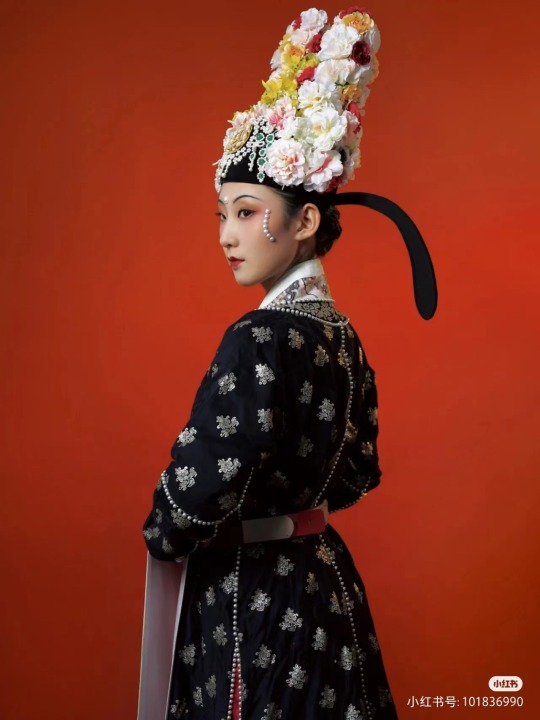

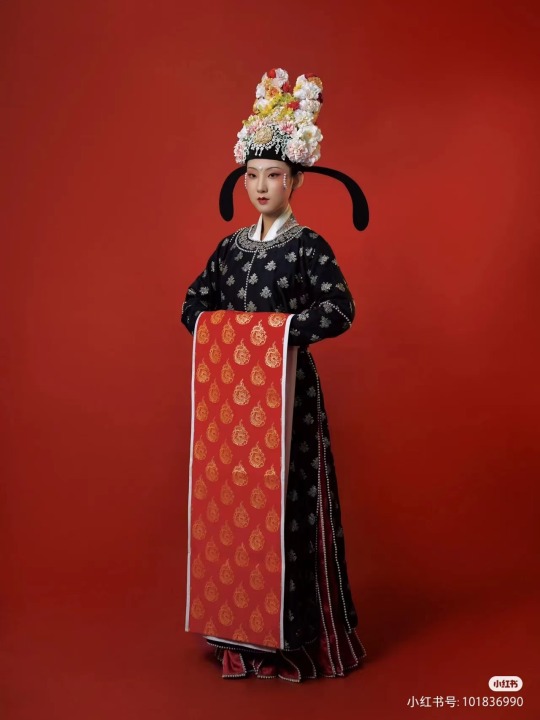
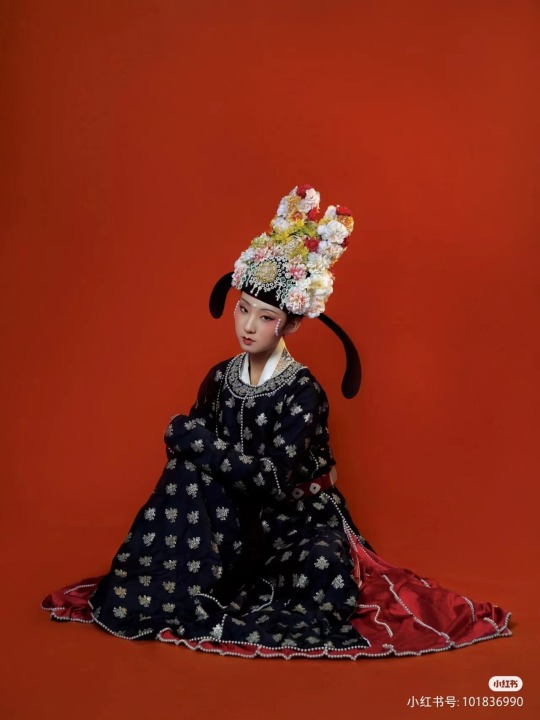

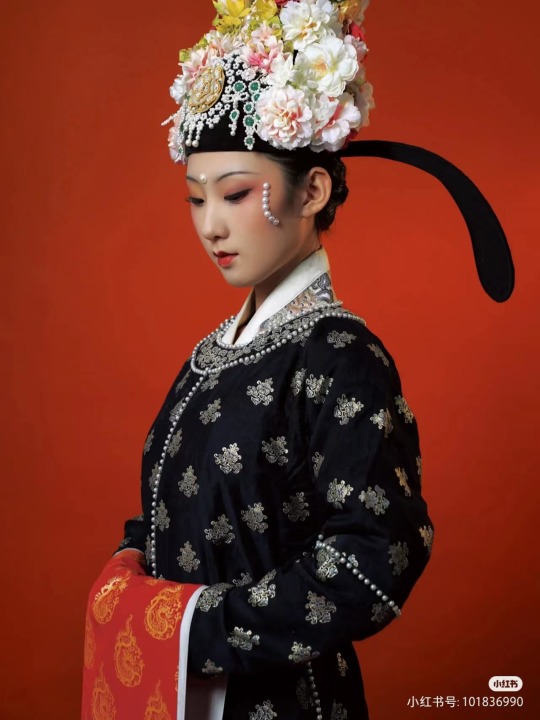
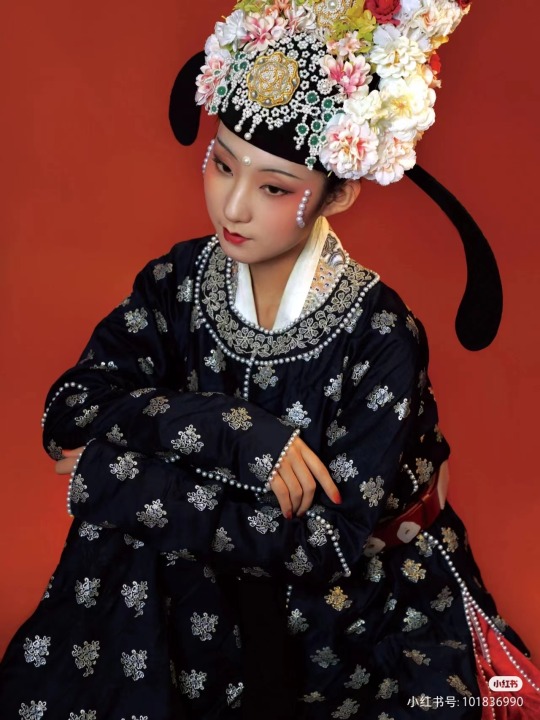
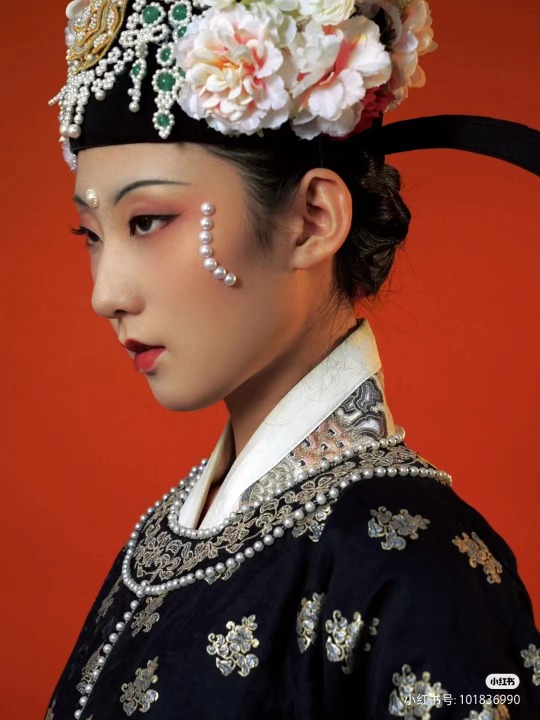
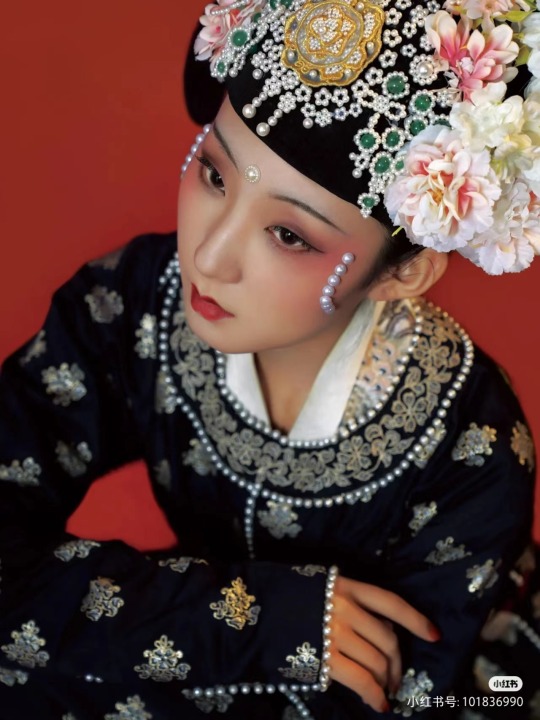
【Historical Reference Artifacts】:
Court Maid in Portrait of Empress Cao in Song Dynasty(Wife of Emperor Renzong)
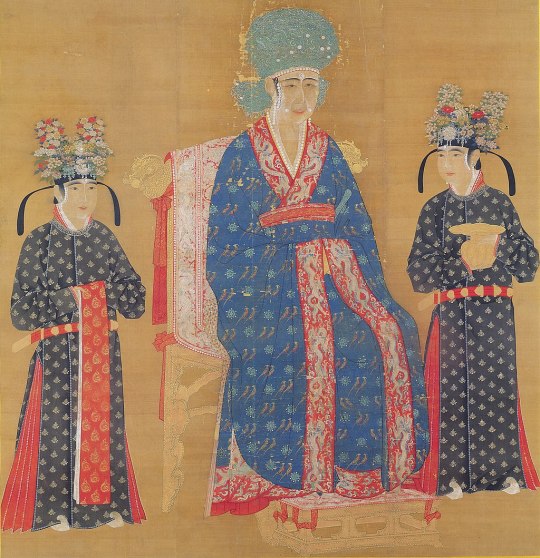

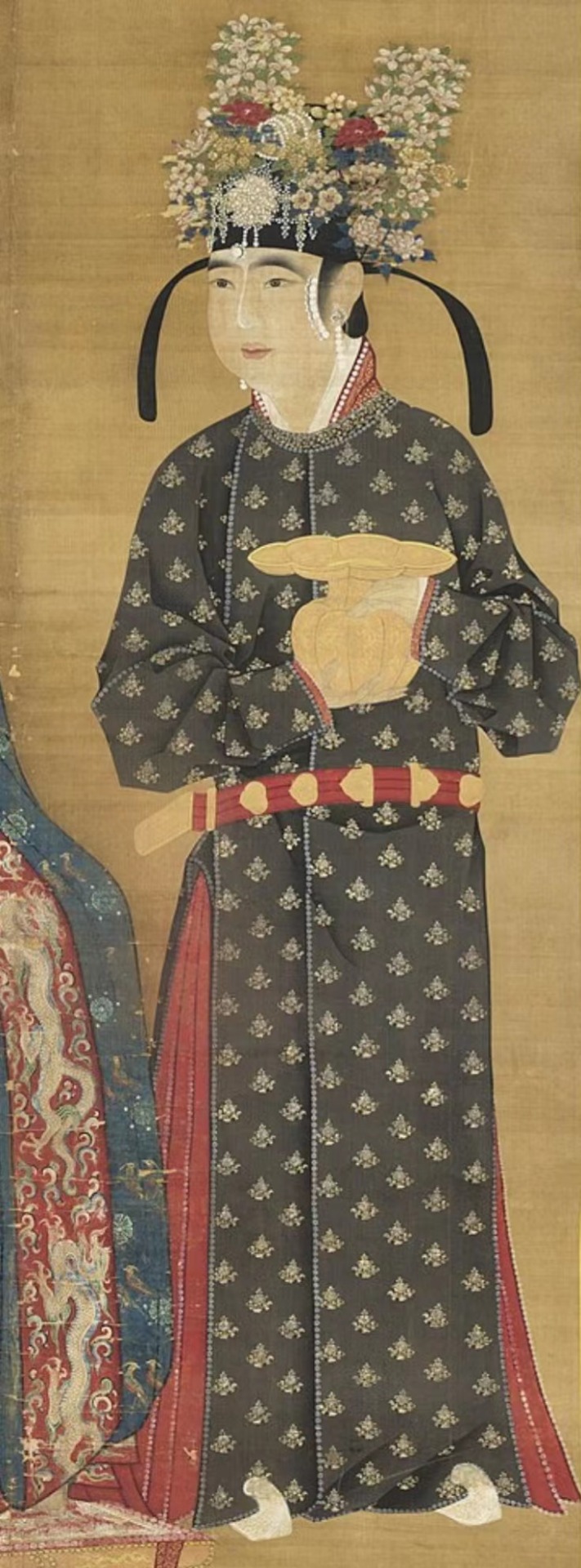
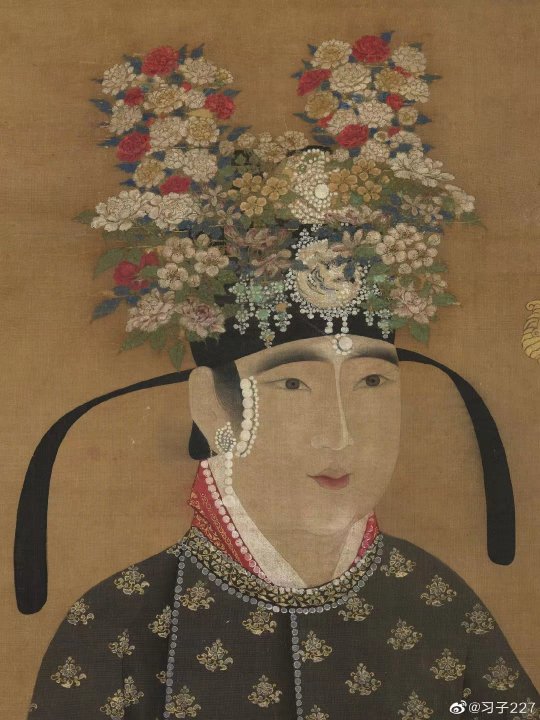
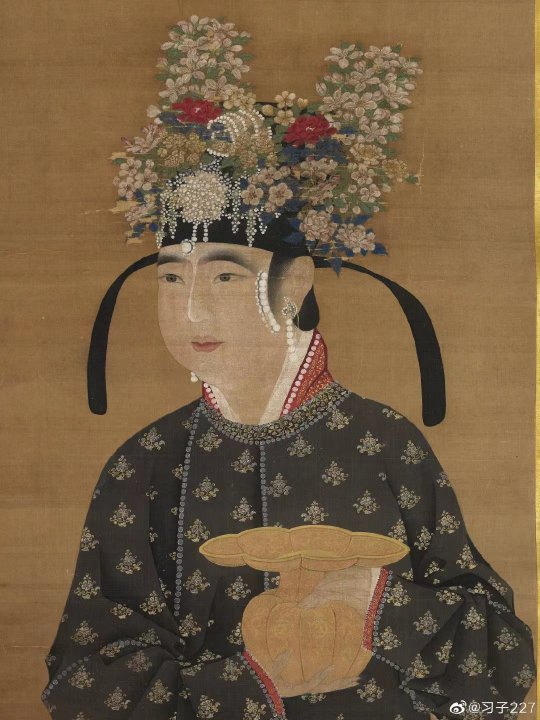
[Hanfu · 漢服]Chinese Song Dynasty (960–1279 AD)Traditional Clothing Hanfu Photoshoot
Court Maid Attire in Song Dynasty “今为臣,是助舟行水上,分水之桨也,与衣妆无系”
________________
💃🏻Model: @秦卿卿
📸Photo: @杜甫大人的日常
🔗Weibo:http://xhslink.com/892PMs
________________
#hanfu#recreation#song dynasty#court maid#maid#servant#empress cao#royalty and nobility#yuanlingpao#yinianjing#huaguan#flower crown#hair ornaments#pearl makeup#huadian#xiehong#chinese painting#history#reference#秦卿卿#杜甫大人的日常#historical fashion
246 notes
·
View notes
Text
Edit: Turning off reblogs on this post since I've been told it contains misinformation. Also, someone reblogged it with a huge rant and blocked me (as far as I can tell), leaving me unable to reply and with only partial notes and that freaks me out.
So I was telling someone about my boy, Sejong the Great of Joeson, who deserves that title "great" since he was so concerned about illiteracy that he created the easy-to-learn Korean alphabet (Hangul) by himself, but then the nobility got mad about all these reading peasants and tried to ban it. And my friend says, "Oh, I thought illiterate poor people in the past were just lazy."
And I was like, "No, no, you don't want your indentured servants and peasants reading and figuring out how much you are screwing them over. The adapted Chinese characters that Korea had been using took years to learn so it was a natural gatekeeper of knowledge."
And then, because one must be fair, I went on to explain how Europeans locked up their knowledge behind Latin, especially the Bible, and how it was so important that Martin Luther translated it into everyday German, because once you can read the Bible yourself, you can challenge the almost absolute power of the church. Only the rich could afford to learn Latin, so only the rich could read the book that their entire society was allegedly based around.
I do think things are much better today, but why are most scientific papers paywalled and scientists sometimes act as if they should be treated like infallible priests...
Edit: I wanted to end this post on a happy note, but then I started thinking about paywalls and it made me a bit depressed. We still do make our best knowledge less accessible to the average person and I hope we can do more to change that.
#science#history#literacy#you will pry my books from my cold dead hands#if you can't explain your research you can't expect people to blindly follow you#so difficult to have absolute power once people can read#also i couldn't access papers that i wrote myself once i wasn't working at a university#but the main point is that poor people aren't lazy#they did this on purpose
508 notes
·
View notes
Link
Ye Fashan’s Taoist achievements marked a fateful for Ye lineage transition from the Way of the Celestial Masters (天師道, Tianshi dao) to the practices of the Supreme Clarity (Shangqing, 上清派). This doctrinal turn subsequently linked the Ye family to the Shangqing school for many centuries.
Part 1, Part 3.
#taoism#tang#tang dynasty#Taoist#taoist sword#taoist immortal#taoist magic#taoist sorcery#Taoist Ritual#chinese mythology#daoism#chinese nobility#chinese surnames#cultivation#fu talisman#inner alchemy#genealogy#maoshan#shangqing#xuanzong#supreme clarity#mount penglai#duke of ye#mao ying#celestial master#shen zhuliang#taoist saint#lingbao#葉 surname#tianshi
0 notes
Note
Hello there! I would like your advice on what chinese emperors wear? I need some references for an oc I have and I dont want to be inaccurate with his design.
Hi! Thanks for the question, and sorry for taking ages to reply!
I have a post about what Chinese emperors wear in this post, so please check it out!
I also have an emperor tag and a royalty and nobility tag for more references.
Hope this helps!
#hanfu#mens hanfu#emperor#royalty and nobility#history#ask#reply#starryorbs#reference#m#x#s#chinese clothing#chinese fashion#china
18 notes
·
View notes
Text

In the Chinese version of Super Mario Odyssey, Mario's pirate outfit was edited and renamed into the "Nobility Outfit", which removed all overt pirate references such as the skull on the hat and the eyepatch.
Main Blog | Twitter | Patreon | Small Findings | Source
2K notes
·
View notes
Text
PSA: Mithrun doesn't run a noodle shop after the end of the manga!
(WARNING FOR SPOILERS)
Awhile back I posted a PSA about how Mickbell and Kuro don't run a noodle shop in the canon, they run an "everything store." In this post I mentioned that "Mithrun running a noodle shop" was also not canon, and that I'd get around to talking about it later.
Both of these fanons are the result of some mistranslation and information getting passed through multiple people, resulting in a very popular fanon that some people think is canon, that Mithrun is running an Asian-style noodle shop in Merini, and that he's in competition with Mickbell and Kuro.
Please note, I'm not saying there's anything wrong with Mithrun (or Mickbell and Kuro) running a noodle shop! If you like the idea and want to write or draw things about that, it's fine! It's just not canon.
SO WHAT IS CANON?
Unfortunately a lot of the information we have about what happens to Mithrun after the end of the manga comes from the still untranslated second version of the Adventurer's Bible, a Chinese Q&A posted by Kui's Chinese publisher, and autograph sessions where Kui answered fan questions, and fans posted about it on Twitter and Reddit.
You can understand why the last one, fans self-reporting what Kui told them, is extremely unreliable and shouldn't be considered the same level of "canon" as something that Kui had printed and published, or that was recorded in an official capacity.
A fan at the Korean signing described it like this (paraphrasing for clarity):
A group of about 100 fans gathered in big room with a screen, where they were playing the anime. The publisher called us up one by one, and we were guided to a smaller room, where Kui was sitting with 5-6 people from the publisher and a translator. We were not allowed to use our phones to take pictures or video.
I don't know if all of the signing events were like this, but we know that Kui and many other manga artists want to preserve their personal privacy, so I'd assume most of these events are run this way.
This makes information from autograph sessions really unreliable, since anyone could post anything online and claim Kui said it, and even other fans who were at the event wouldn't be able to prove that it wasn't true.
I have heard that sometimes fans "overheard" answers that other fans got, which doesn't fit with the above description, so some signings may have not been that private... Or maybe after a fan got their autograph, they talked with other fans at the event and shared information that way? Or maybe they talked about it online afterwards? I can't say for certain.
Anyway, moving on!
IF HE'S NOT RUNNING A NOODLE SHOP, WHAT IS MITHRUN DOING?
Here's Mithrun's updated biography page from the World Guide:
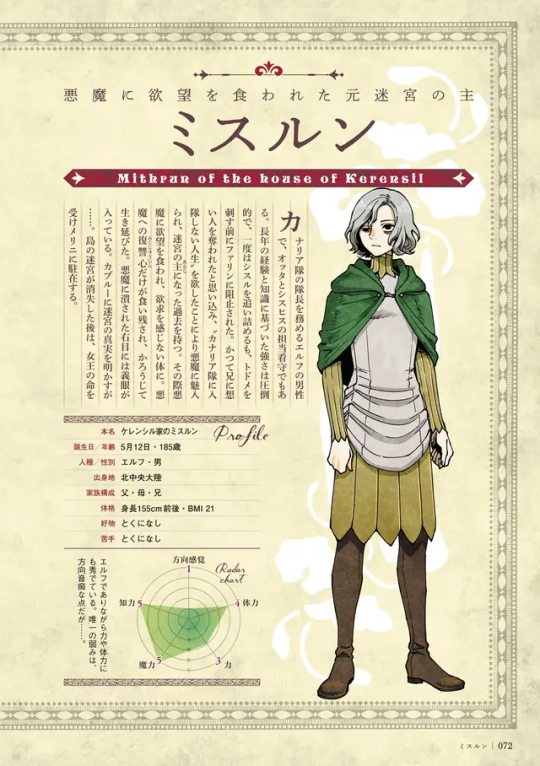
"島の迷宮が消失した後は、女王の命を受けメリニに駐在する。"
"After the island labyrinth disappears, he is stationed in Merini under the orders of the Queen."
The confusing part here is that another comic says Mithrun is retiring, and that he'll no longer be part of the Canaries.
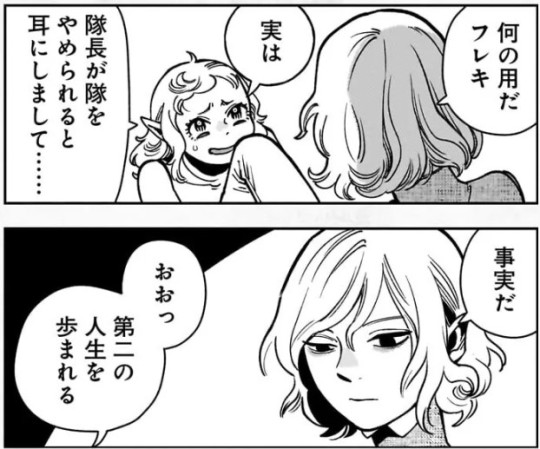
MITHRUN: 何の用だフレキ (What do you want, Fleki?) FLEKI: 実は隊長が隊をやめられると 耳にしまして・・…. (I actually heard that the captain is leaving the squad…) MITHRUN: 事実だ (It's true.) FLEKI: おおっ第二の人生を歩まれる (Oh, you're starting a second life.)
Cithis also confirms that Mithrun is leaving the Canaries:
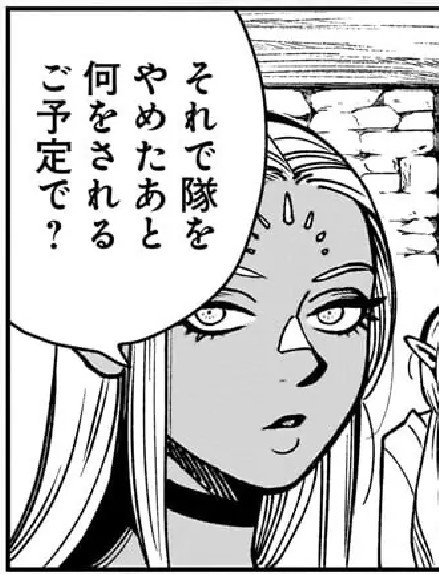
"それで隊をやめたあと何をされるご予定で? (So what are you planning to do after you leave the corps?)"
This seems like it would be a contradiction with "he is stationed in Merini under the orders of the Queen." If he's retired, why is he still taking orders? Why is he stationed there, a term normally used for military duty?
I think what Kui is telling us is that even though Mithrun isn't a Canary anymore, he's still nobility, and as a noble he has to obey the elf queen, and even if he isn't actively a Canary, he's considered a military asset - one of the duties of nobility is to always be ready to perform military service for their monarch.
Since the elf queen is an absolute monarch, anything Mithrun does is "with the Queen's permission/under her orders," since she owns her subjects.
(This is fun because it hints at potential future conflict. Will the Queen ever command Mithrun to do something he doesn't want to do? What happens if he refuses? Will he defect, and swear allegiance to his new home in Merini instead?)
Ok, Mithrun's retired from the Canaries, but what is he going to do in Merini?
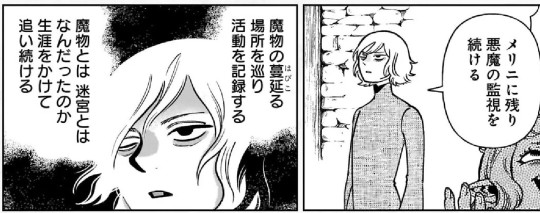
"メリニに残り悪魔の監視を続けるはびこ魔物の蔓延る場所を巡り活動を記録する魔物とは 迷宮とは なんだったのか 生涯をかけて 追い続ける (I'll remain in Merini, and continue to watch out for demons. I'll travel to places where monsters gather and record their activities. I'll spend the rest of my life seeking to understand monsters, and the labyrinth.)"
(Why does the translation call it a labyrinth, not a dungeon? PSA on this here.)
As you can see, there's no mention of noodles here. Mithrun has something he seriously, passionately wants to do, and he plans to do it for the rest of his life. Fleki's reaction, by the way, is complete and utter horror (she was hoping Mithrun would return to his family's wealthy estate and she could mooch off of him):
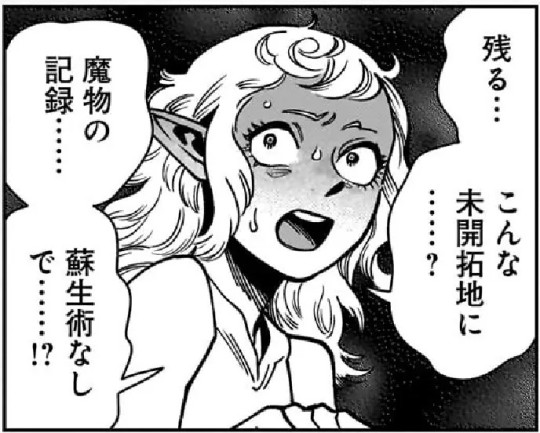
"残る・・・魔物のこんな未開拓地に? 蘇生術なし (Remaining here… in such a primitive country that's full of monsters? Without resurrection magic?)"
This tells us that the elves probably consider the Eastern Continent an uncivilized and primitive place, where an elf wouldn't want to stay longer than necessary. Fleki seems to think living there would be worse than going back to prison in the elven lands.
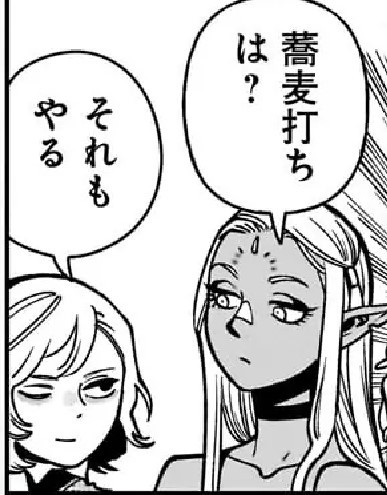
Here is where some of the confusion probably starts:
CITHIS: 蕎麦打ち は? (What about making noodles?) MITHRUN: それもやる (I'll do that too.)
Note that Cithis does not say running a noodle shop, she just says "making noodles."
Obviously a person can make noodles for themselves, or for the people around them, without getting into the huge enterprise of opening a restaurant. It's illogical to assume "I'll make noodles" actually means "I'll open a restaurant that serves noodles."
Also, Mithrun is smirking when he answers Cithis, which implies that he's joking, or being sarcastic. This makes sense because "what about making noodles?" is part of a running joke in the manga about ramen noodles and how their presence in the primarily European-style setting of Dungeon Meshi doesn't make sense.
THE RUNNING GAG ABOUT RAMEN
The word Cithis uses, soba (蕎麦), literally means "buckwheat." The full name for buckwheat noodles is soba-kiri (蕎麦切り "buckwheat slices"), but soba is commonly used alone.
Historically, soba noodles were called Nihon-soba, Wa-soba, or Yamato-soba, all of which mean "Japanese noodle." This was meant to distinguish Japanese buckwheat noodles from wheat noodles of Chinese origin, such as ramen, sōmen, or udon.
In the modern era, soba is the word used to refer to noodles in general, regardless of origin or composition. So Italian noodles can be described as a type of soba.
The loan word パスタ (pasuta) is what is normally used to talk about Italian noodles, but the confusion between soba (Japanese buckwheat noodles) and soba (any other type of noodle) is the core of Kui's joke.
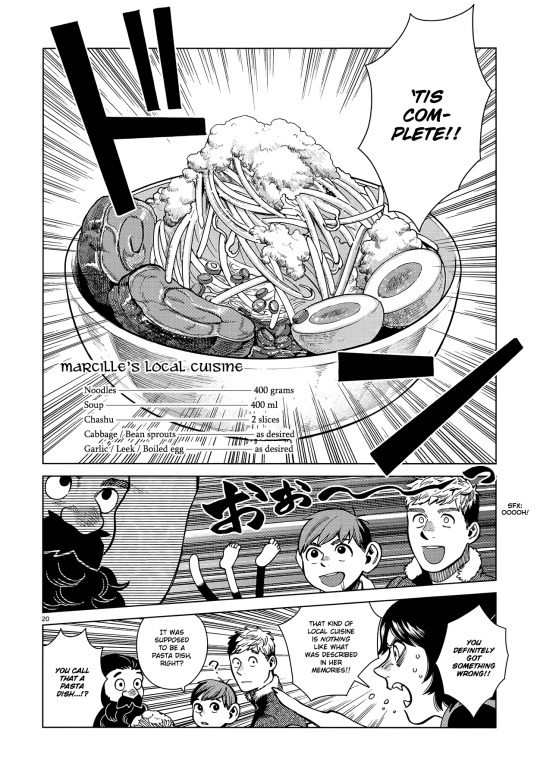
In Chapter 81, Laios and his party try to make food for Marcille that will remind her of her home and childhood (which is clearly supposed to be someplace like Italy) but they end up making Japanese-style pork ramen instead. The punchline is that Izutsumi, the only Japanese member of the party, can tell that they've made the wrong type of noodles, but the rest of the party doesn't understand what she's talking about to a comical and ridiculous extent.

In Chapter 94, when Kabru and the Canaries are trying to encourage Mithrun to keep on living, Fleki and Lycion go off on a comical tangent about making noodles:

The punchline of this joke is that Kui is depicting Mithrun servingJapanese-style noodles, which makes no sense because the elves aren't Japanese... Something we know for a fact because there are actual explicitly Japanese characters in Dungeon Meshi. Laios thinks "That's like Marcille's (local cuisine)..." in reference to the joke in Chapter 81.
The panel on the left shows Mithrun looking like a stereotypical ramen stand operator: gruff, covered in sweat, proudly presenting his finished work.
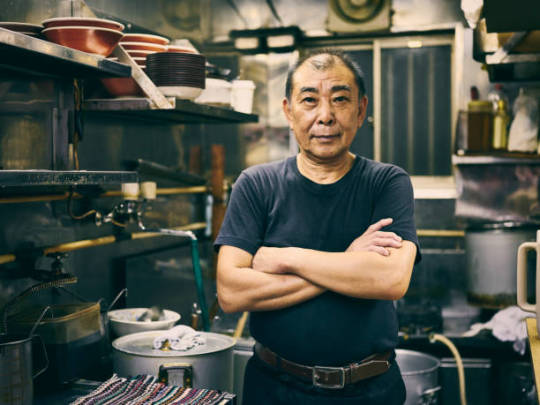
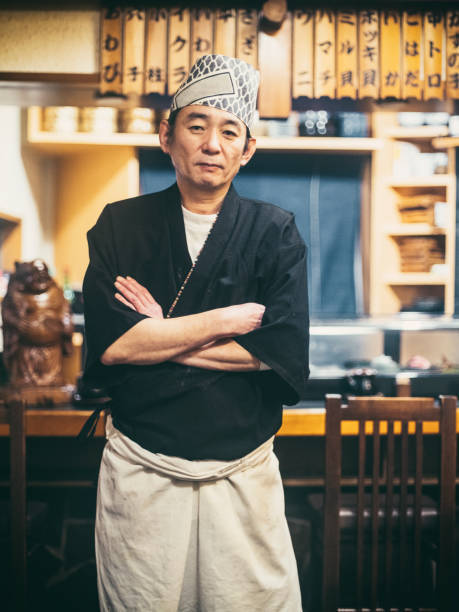

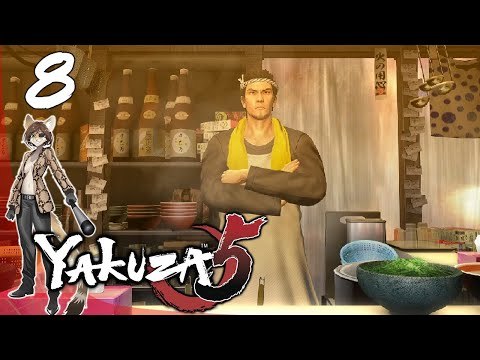
(Sorry for using your thumbnail, random furry youtuber.)
The headband, black tunic and white apron that Mithrun is wearing, and even the crossed arms in Laios' imagination is part of the look of your stereotypical Japanese chef.
So it's understandable that people look at all this, and think "Mithrun will run a Japanese-style ramen stand!" because it's a very cute, very funny idea.
But canonically it's an idea that only exists in Laios' imagination, as something that is meant to be comically outlandish, because the things Lycion and Fleki are saying are also presented as being pretty silly. A bit of levity in an otherwise very melancholy chapter.
I'll also note that when Lycion talks about Mithrun making soup bowls to serve his noodles in, he says "He could enjoy his handmade cuisine in his own bowls!"
There's no mention of serving the noodles to anyone else, just that Mithrun could enjoy the satisfaction of being self-sufficient, making his food and tableware from scratch. This is something which actually aligns very well with the themes of Dungeon Meshi.
DIDN'T KUI SAY MITHRUN IS MAKING NOODLES IN A Q&A?
During the post-manga publicity tour Kui went on, she did several signings where she answered short questions from fans while giving out autographs and drawings.
Remember, these questions and answers are being collected by fans from random tweets and other posts online, translated into English by amateurs, and there is no way to prove their veracity.
Q. Did Mithrun get to live a happy life after ending? A. He is doing work and hobby, living a happy and fulfilled life, although he is not that friendly so he will not be doing diplomat for a long time.
Taking this information at face value and assuming it's true, it sounds like Kui differentiated between "work" and "hobby" - So Mithrun has something he is doing seriously, like a job, and something he is doing for fun, as a hobby.
This makes sense with what we've seen in the official materials: monitoring the monsters and keeping watch for the return of the demon is Mithrun's "job", and making noodles (and doing other things, probably, since the noodles were a joke) are Mithrun's hobbies.
WHAT ABOUT THE WRITTEN WEIBO Q&A?
These Chinese fan questions were answered by Kui in written form, and posted online by her Chinese publisher in both Chinese and Japanese, so in my opinion, these answers should be taken more seriously than things that were solely reported by fans.
However, the question and answer about noodles here is clearly a light-hearted joke:
Q: 米斯伦会做出什么样的荞麦面?(What kind of soba will Mithrun make?) A: おいしい蕎麦だといいですね。(I hope they're delicious soba.)
As with many other answers, you can see that Kui answers in a vague, polite, and gently joking way. "What kind of noodles will Mithrun make?" "Tasty ones, hopefully!"
It's similar to how she answered questions about if Falin's lifespan is longer because she's a chimera or if Thistle is still alive with "That would be nice!" or "I hope so!"
This is clearly a sort of non-answer, but even if you take it to mean "Mithrun is 100% for sure making noodles," there is still zero indication that Mithrun is canonically running a restaurant.
In closing: if you want him to run a noodle restaurant in your heart, in your fanfics, in your fanart, that is perfectly fine! Japanese fans love this idea (they use pasta emojis to represent Mithrun!) and there's tons of artwork about Mithrun being a ramen chef. I think that would be a lovely thing for him to do! I bet he'd have a lot of fun!
But it's not canon.
What is canon is that he's living in Merini, going to group therapy, learning to appreciate the people around him, enjoying himself, and both his work and his hobbies are going well 💕
#dungeon meshi#delicious in dungeon#spoilers#dungeon meshi spoilers#mithrun#mithrun of the house of kerensil#dunmeshi#PSA
174 notes
·
View notes
Text
wuxia and confucianism
Hey. Thought I'd answer the wuxia-confucian question very briefly. I did suggest wuxia being closely knitted to confucianism, but I do understand the other perspective of wuxia being anti-confucian. Quick answer only because I've got little time right now -- might add on to it later!!

confucianism
First the central themes of confucianism:
常 (cháng): Virtues of compassion and courtesy. 仁 (rén)、义 (yì)、礼 (lǐ)、智 (zhì)、信 (xìn)、忠 (zhōng)、孝 (xiào)、悌 (tì) (there are more). These in order in crude translation mean compassion, righteousness, courtesy, wisdom, integrity, loyalty, filial piety, and respect to one's older siblings. These are the main ideas Confucius, the founder of Confucianism, wished to spread through his philosophy.
纲 (gāng): Order. This is about the relationships between people, the filial piety of a child to their parents, the relationship between significant others, between friends and teachers, and expanding outwards in the sphere of influence in our circle of life, the patriotism and loyalty of a liege to his lord.
Understand that Confucius came up with these ideas in a time of war. He lived his life traversing different kingdoms and establishing his prominence by getting emperors to trust him as a consultant and employ his school of ideas. As such, these beliefs are very much centred around creating harmony and order in society, and of course entails the respect of commoners and lieges to their lords (because why else would kings employ his beliefs over other schools of philosophy if not so?).
wuxia
Moving on to the wuxia genre, the 侠 (xiá) in wuxia emphasises righteousness. xia, as people, are itinerants and rebels in the fictitious pugilistic society who tire of the power of the aristocracy and seek to use their own, often unlawful ways, to help others through 锄强扶弱 (chú qiáng fú ruò) -- helping the needy and going against the strong (the morals are debatable but that's me trying to sum up wuxia in 5 minutes off the top of my head rip).

conclusions
So I guess that's enough information for you to form your own conclusions, and here's what I think, at the very least.
Against Confucianism -- Subverting the power pyramid. Many of the heroes/xia's in wuxia are lawless rebels. They aren't good, upstanding citizens of the society. Hell, xia was first popularised from 游侠列传 (yóu xiá liè zhuàn) in the Han dynasty records, talking about how a "xia" went against the officials and helped the commoners in the name of righteousness. This goes against the confucian beliefs of respecting your lord and serving the kingdom.* That's why I can understand why some would consider wuxia going against confucianism.
Align with Confucianism -- Righteousness. Ultimately, however, wuxia is about righteousness and nobility and honour, defined by society and commoners and not by royal blood. These values of etiquette, decorum, and nobility were long ingrained in the hearts of all these chinese characters, from when the courtesy and etiquette rules were defined in the Zhou dynasty, and afterwards, from the Han dynasty on, when emperors heavily employed Confucian beliefs in education and throughout society because it helps in rebuilding a harmonious society.
Confucianism is about compassion and righteousness, the staples permeating and defining chinese culture in the last two thousand years, and it is these values that serve as the central impetus of the xia and wuxia genres. People are born into these values; as such they fight against the injustice they see, and thus engenders the lost xia's of every dynasty.

*And well, even Confucius wasn't that dead set on fealty to lords. Confucian highly venerated loyalty, but when the court is corrupt, they acknowledge insurgence over the mindless following of an emperor. This is a story for another day, one I would have to back up with more quotes and citations, but I hope this answered your questions, or even better, let you form some conclusions of your own :)
Confucian philosophy is only one aspect that has correlations/influences over the "xia" genre, there are many other interesting things to say about Taoism and Buddhism as well (e.g. Jin Yong's wuxia classics have quite a bit of Buddhist values in the characters owing to author preferences), it's definitely worth looking up on these things if you're interested!
initially reblogged under the original meta post on wuxia, xianxia, and cultivation differences, but i realised it was too long and would bury the reply, so please don't mind me creating a new post for this again.
feel free to ask and discuss!!
#chinese#cdrama#danmei#philosophy#chinese language#chinese culture#wuxia#cnovel#chinese history#confucius#confucianism#chinese philosophy#fate's meta
435 notes
·
View notes
Text
tangentially i will never ever recover from running into someone who typed, in full sincerity, with their human hands, "as a socialist, edelgard is the only lord whose politics i can support"
it's been ages since i engaged with FE3H outside my corner of immediate friends, which is ideal, but it does mean that every so often i step outside it and am smacked in the face by "[lord i dislike] is [some kind of bigot and/or fascist] and all of their fans are simpbrained apologists" discourse
#bird original#like i'm being a hypocrite because i do have opinions on dimitri's politics#but at end of the day they're all hereditary nobility. pick your favorite color-coded war criminal like the rest of us#though on the other other hand edelgard getting the reputation as the egalitarian socialist lord is still baffling to me#her dialogue is all 'meritocracy bootstraps individualism' which follows from her character/experiences -- like that's her Deal#it's her Thing it's her Tragic Flaw#i'm pretty sure her planned reforms are meant to reference the historical chinese imperial exams#since adrestia has a few historical/cultural references to imperial china#anyway the moral of the story is that if you're talking about the politics of FE3H you have to remember that it's a fundamentally#pro-imperialism text about which color-coded war criminal gets to be the hegemonic ruler of the continent#i didn't mean to turn this into a tag essay but there you go#it's my post and i can do what i want
7 notes
·
View notes
Text
Touchstarved character name meanings!
Lemme preface this by saying I’m not a name meanings expert I just love crawling through google pages and over analyzing things ALSO to make sure the results weren’t influenced by fandom everything here is from pre-2020! With that let’s get into things!
Mhin:
Mhin is a little bit tricky, as I can’t find anything for their name spelled as it is. Min, however, has several different sources and meanings.
In Chinese, Min (敏) meanings “quick, clever, sharp” Which seems rather fitting for our neighborhood soulless hunter. An alternative script for Min (民) translates to “people, citizens” which could have some interesting implications, as Mhin is implied to have strong connections to the city of Lovent.
In Burmese Min means “king, ruler” which, connected with the second Chinese translation, could perhaps be some foreshadowing? We don’t know how Mhin is connected to Lovent, but the city must have had a ruling class, perhaps Mhin held a position of power? It could also be why they survived, and which a powerful curse nonetheless
Finally, in Irish Min is said to mean “smooth, fine, small”, though I can’t find as many sources on this one. I include it because people have pointed out Mhin’s cloak pins are triquetra, which are Celtic symbols.
Kuras:
Please know I adore Kuras when I say this, but he really got the short end of the naming stick it seems. The most promising thing I can find is the usage as a Hindi surname, which doesn’t seem to have a meaning listed. If you remove the S and go with Kura, it can mean “river” in Turkish or possibly “fierceness, tiger” in Japanese.
Now here’s the silly translations! In Arabic, Kuras (كراس) seems to translate to brochure. In polish, it translates to chicken.
I truly doubt the devs thought brochure/chicken were good labels for the dear doctor, so I’m favoring the Turkish translation. Mostly because Eridia is a city divided by a river; could there be something deeper hidden in there? Maybe!
Ais:
So clearly Ais has a lot of Japanese influence, with his design being inspired by Oni, so I looked for those possible translations first. Ai (愛) translates to love in Japanese, and is typically used as a broader term to refer to emotions tied to like compassion, empathy, or platonic forms of love (as opposed to 恋/koi which refers to romantic love).
I’m gonna focus on this translation for a bit. Someone on a translation forum phrased it in a way I really love: “Ai” is something you do or give. Ais is our introduction to the Seaspring, and to groupminds in general. While the concept of a hivemind is usually used in horror as a way of taking away agency, the Seaspring is framed as a refuge for people to turn to. Could Ais’ name be an allusion to a goal he keeps hidden? Is the Seaspring a manifestation of a desire to give love despite the violent world? Or am I just reading into this too deep?
Vere:
Vere actually has a straight up name meaning! Most of the sources I found say that Vere is a French/Gaulish name meaning “Alder”, and it usually pops up in the surname “De Vere”. Alders are a kind of bitch tree, and I have no idea how that tie into Vere as a character.
But if we take “Vere” as a word rather then a name, then Latin translates it as meaning “truly, really, actually, rightly”. Vere’s introduction to us is as someone to not trust, a cunning fox waiting for the next meal, stealing our darn room key and lying about it! So I find it really interesting that his name could be a word for truth. Perhaps before his chains Vere was someone a lot more truthful ?
Leander:
Big shout out to Leander for having a plain ass easy to translate name. I’ll give you googles exact definition here: "lion of a man", from leon, "lion", and andros, "man".
That was easy, so now let’s pick it apart!
Traditionally, lions are symbols of nobility, courage, strength, and protection. Leander has a reputation for being That Guy; he’s a leader, a protector of the masses, etc etc. for all intents and purposes, Leander really is a lion of a man!
…On the surface at least. Because under all the symbolism, lions are still predators, no matter how noble.
#pls feel free to add on to this bc I did half this research at a lizzy mcalpine concert LMAO#I love name meanings ahhhhhhh#red spring studios#Touchstarved game#ais touchstarved#touchstarved kuras#mhin touchstarved#vere touchstarved#touchstarved leander#symbolism#theories
221 notes
·
View notes